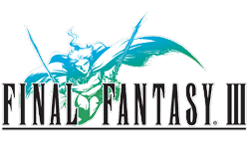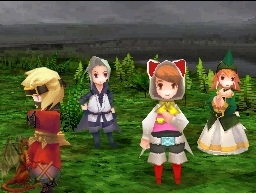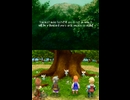|
|

|
BATTLE SYSTEM
|

|
INTERACTION
|

|
ORIGINALITY
|

|
STORY
|

|
MUSIC & SOUND
|

|
VISUALS
|

|
CHALLENGE
|
Medium
|
COMPLETION TIME
|
25-50 Hours
|
|
OVERALL
3.5/5
|
Rating definitions
|
|
|
An orphan named Luneth has fallen deep into a cavern, which he explores, trying to find his way out. Near the end, he finds a large crystal, whose spirit tells him he is a Warrior of Light, destined to bring peace to the world. After he leaves, he begins his long trip across the world, finding the three other chosen Warriors of Light to save the world. Final Fantasy III was originally released on the Famicom in Japan and would be one of the few titles in the franchise never to reach North American shores until it was remade for the Nintendo DS in 2006. FF3 proves to be a solid title, although certain drawbacks that plagued the NES version haunt the DS version as well, preventing it from being a masterpiece.
As with the first three NES Final Fantasies, FF3 features completely-turn-based combat instead of the Active Time system of most of its successors. The player can input a command for up to four characters and lets them and the enemy beat up one another in a round. As with most turn-based battle systems, character and enemy turn order is unpredictable, and irritatingly varies at times. Still, normal random battles are pretty fast-paced and rarely drag on forever, perhaps because the game pits no more than three enemies against your party in all random encounters. Even so, many bosses and a few normal enemies can certainly be challenging at times.
The heart of FF3's battle engine is the class system, with new classes gained from each of the four crystals throughout the game, including warrior, monk, white mage, black mage, and so forth. Each class, of course, has its own strengths and weaknesses, and depending upon how often your characters fight while of a certain class, their Job Level with the class will gradually increase, bolstering that character's effectiveness with the class. Players can change a character's class any time outside of battle, although doing so will temporarily give that character crystal sickness, where their stats are decreased for a certain number of battles. It's still a solid battle system, though, and certainly a main draw to the remake.
 The furry fandom finally finds a place in Final Fantasy
The furry fandom finally finds a place in Final Fantasy
|
|
The interface isn't too problematic, although there are nonetheless a few irritating features. For one, there are no save points in dungeons, which can sometimes deprive the player of progress when a boss at the end of a long dungeon slaughters their party. Still, the game does utilize a quick-delete-save feature, and a teleportation spell can spare players the inconvenience of retracing their steps to leave a dungeon. There's also an annoyance where, if you utilize the game's Wi-Fi connectivity to send mail to friends, you must switch to a separate screen to input punctuation and spaces in your mail, which, even with the stylus, can be irksome. Overall, interaction isn't terrible, although there are certain issues that could've easily been resolved.
Originality is always hard to discern in a remake (RPGamer, in this reviewer's opinion, should just abolish the category because of issues like this and the fact that no one's played every RPG in existence), although the visual overhaul especially separates the remake from the original, alongside features such as the aforementioned Wi-Fi mail system. The Famicom version, moreover, was the first of the series to have a class system, even if it wasn't the very first class system in the genre. Then there are features such as the music, the world, and by extent the story, that of course return from the original. All in all, FF3 is plentifully original for a remake.
The story received some improvement from the original, although it nonetheless retains the skeletal disposition of the Famicom version, much akin to most 8-bit-era RPG storylines. It is nice that the four generic Onion Kids of the original have been replaced with actual characters with names and a bit of description when you get them in your party, although the backstory largely reflects the generic "light vs. dark" camp of many other RPG stories, and both the pacing and character development are on the shallow side, with the playable characters mostly being interchangeable. In the end, the plot is, at best, generic and paper-thin.
 Apparently bathroom business severely interferes with saving the world...
Apparently bathroom business severely interferes with saving the world...
|
|
The music, though, is one solid feature retained from the Famicom version. It is perhaps composer Nobuo Uematsu's best soundtrack among the Famicom Final Fantasies, with solid tracks such as the overworld theme, perhaps one of the best in the genre. Headphones, as is the apparent case with most portable titles, somewhat increases the musical quality. Granted, there are some imperfections, such as many tracks not lasting more than a minute before looping, although they largely compensate for this in terms of quality. Sound effects are plentifully diverse, as well, with most weapons in battle having different sounds, for instance. Overall, the aurals are definitely one of the main draws to the remake.
The visuals are, as well, with FF3 making a full leap to 3-D, which largely maximizes the DS's visual capabilities and even features an introductory FMV. Characters in battle, along with the enemies, are reasonably animated, although attacks contain the odd telekinetic appearance of the original six Final Fantasies. There is, moreover, a sizeable degree of graininess with the graphics, as well as pixilated texturing during close-ups of environs and your characters. Even so, the Nintendo DS's graphical capabilities aren't nearly on par with those of say, the Playstation Portable, so these shortcomings are certainly forgivable, and the visuals, in summation, are another decent draw to the remake.
FF3, finally, will keep players occupied for a good twenty-five to fifty hours, with a few sidequests, some of which require Wi-Fi communication to unlock, potentially boosting playtime. In the end, Final Fantasy III decently completes the saga of the legendary franchise in North America over a decade after the original version's release in Japan. Its solid gameplay and presentation are sure to draw gamers simply looking for a fun RPG to keep them occupied, although its story, admittedly, certainly won't keep players on edge. Still, with the remake's release, American gamers can, at long last, legally enjoy all installments of the Final Fantasy franchise.
Review Archives
|









